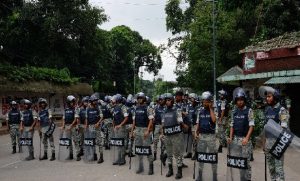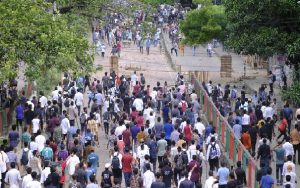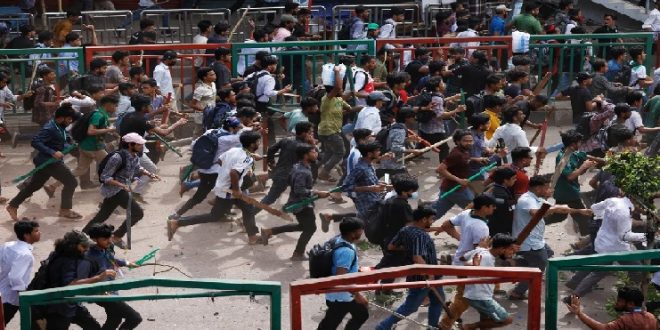19-07-2024
DHAKA: Police in Bangladesh fired tear gas and rubber bullets to disperse students protesting against the government’s job quota system on Wednesday, a day after violent clashes left six people dead and scores injured.
Authorities also announced the indefinite closure of all public and private universities from Wednesday following the protests over public sector job quotas, which include a 30% reservation for family members of fighters from the 1971 War of Independence from Pakistan.
 Authorities deployed units of the paramilitary Border Guard force alongside riot police on Wednesday outside the Dhaka University campus as students chanted: “We will not let our brothers’ blood go in vain”.
Authorities deployed units of the paramilitary Border Guard force alongside riot police on Wednesday outside the Dhaka University campus as students chanted: “We will not let our brothers’ blood go in vain”.
Police fired teargas and rubber bullets and lobbed sound grenades at the students as they marched in processions carrying coffins in solidarity with those killed, said Nahid Islam, the coordinator of the anti-quota protests.
The quotas have caused anger among students who face high youth unemployment rates, with nearly 32 million young Bangladeshis not in work or education out of a total population of 170 million people.
Demonstrations intensified after Prime Minister Sheikh Hasina, the daughter of Sheikh Mujibur Rahman, who led Bangladesh’s independence from Pakistan, refused to meet the protesters’ demands. She labelled those opposing the quota as “razakar”, a term used for those who allegedly collaborated with the Pakistani army during the 1971 war.
The protests turned violent this week when thousands of anti-quota protesters clashed with members of the student wing of the ruling Awami League party across the country. Six people, including at least three students, were killed during clashes on Tuesday, police said. The protests are the first significant challenge to Hasina’s government since she secured a fourth consecutive term in January in an election boycotted by the opposition Bangladesh Nationalist Party (BNP).
Foreign Minister Hasan Mahmud said the government was sympathetic towards the students and their movement and blamed the BNP and its Islamist ally Jamaat-e-Islami party for the violence.
 International rights group Amnesty International and the United Nations urged the government to protect peaceful protesters against violence.
International rights group Amnesty International and the United Nations urged the government to protect peaceful protesters against violence.
Experts attribute the unrest to stagnant job growth in the private sector, making government jobs, which offer regular wage hikes and other privileges.
Violence was also reported in many other places across the country, with students blocking a bridge, leaving a 10 km-long tailback of vehicles. Police said they had to fire tear gas to disperse stone-throwing BNP activists during a protest in Dhaka.
At least five people were killed and scores injured across Bangladesh on Tuesday as young government supporters and police firing tear gas clashed with students protesting against a quota system for government jobs, police said.
Tens of thousands of students joined nationwide protests for a second day after more than 100 people were injured on Monday in rallies that blocked major highways and rail links.
They are the first significant protests against Prime Minister Sheikh Hasina’s government since she won a fourth straight term in January.
The protesters are angry over public sector job quotas, including a 30% quota for family members of freedom fighters from the 1971 War of Independence, amid high youth unemployment.
Riot police fanned out at university campuses across the country in an effort to quell disturbances. In Rangpur in northwestern Bangladesh, the protests turned violent, police told Reuters. (Int’l News Desk)
 Pressmediaofindia
Pressmediaofindia




